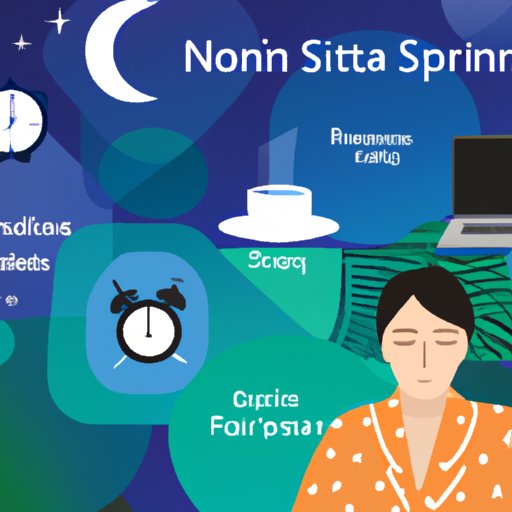Introduction
Insomnia is a common sleep disorder that affects millions of people around the world. It is characterized by difficulty falling asleep, staying asleep, or both, resulting in poor quality and quantity of sleep. Insomnia can have a significant impact on energy levels, mood, mental clarity, and overall wellbeing. In this article, we will explore the causes of insomnia and provide solutions to help you get a better night’s sleep.

Identifying the Causes of Insomnia
There are several possible causes of insomnia. It is important to identify the underlying cause in order to develop an effective treatment plan. Some potential causes include:
Biological Factors
Certain medical conditions, such as asthma, arthritis, and diabetes, can make it difficult to fall asleep and stay asleep. Additionally, hormonal changes during menopause and pregnancy can disrupt sleep patterns. Certain medications, including those used to treat depression and anxiety, can also interfere with sleep.
Psychological Factors
Anxiety, stress, and depression can all contribute to insomnia. Worrying about work, family, or finances can make it difficult to relax and fall asleep. Other psychological factors, such as grief and trauma, can also lead to sleeplessness.
Environmental Factors
Noise, light, and temperature can all affect sleep. Uncomfortable bedding, an unsupportive mattress, and sleeping in an unfamiliar environment can also interfere with getting a good night’s rest.

Exploring Natural Remedies for Better Sleep
If you are having trouble sleeping, there are several natural remedies that may help. Here are some of the most popular:
Exercise
Regular exercise can help to reduce stress and promote better sleep. Aim for at least 30 minutes of moderate physical activity each day. Exercise early in the day to avoid feeling too energized before bedtime.
Herbal Supplements
Certain herbs and supplements, such as valerian root, chamomile, and melatonin, can help to promote relaxation and improve sleep quality. Talk to your doctor before taking any supplements to make sure they are safe for you.
Meditation and Relaxation Techniques
Relaxation techniques, such as deep breathing, progressive muscle relaxation, and visualization, can help to reduce stress and promote better sleep. Practicing mindfulness meditation can also be helpful for calming the mind and body.
Adjusting Your Diet and Lifestyle Habits to Improve Sleep Quality
Making certain lifestyle adjustments can help to improve sleep quality. Here are some tips to try:
Avoiding Caffeine and Alcohol
Caffeine and alcohol are stimulants that can interfere with sleep. Avoid consuming caffeine after 2 pm and limit alcohol consumption to no more than two drinks per day.
Eating a Balanced Diet
Eating healthy foods and avoiding processed snacks can help to regulate blood sugar levels and improve sleep. Eating a diet rich in whole grains, fruits, vegetables, and lean proteins can also help to reduce stress levels.
Establishing a Consistent Sleep Schedule
Going to bed and waking up at the same time every day helps to regulate your body’s internal clock. Avoid napping during the day and limit screen time before bed.
Understanding the Link Between Stress and Poor Sleep
Stress is one of the most common causes of insomnia. When we feel stressed, our bodies release cortisol, which increases alertness and makes it harder to relax and fall asleep. Additionally, stress can cause us to ruminate on worries and fears, making it difficult to quiet the mind and drift off to sleep.
Effects of Stress on Sleep
Chronic stress can lead to long-term sleep issues, such as insomnia, restless leg syndrome, and sleep apnea. It can also lead to fatigue, irritability, and difficulty concentrating.
Ways to Reduce Stress
There are several strategies for managing stress and improving sleep quality. Exercise, yoga, and tai chi can help to reduce stress levels. Mindfulness meditation, journaling, and talking to a therapist can also be beneficial.

Examining the Impact of Technology on Sleep Patterns
The blue light emitted from electronic devices can interfere with the body’s production of melatonin, the hormone responsible for regulating sleep. This can make it difficult to fall asleep and stay asleep.
Limiting Exposure to Blue Light
Turn off all electronic devices at least two hours before bedtime. If you need to use a device, consider wearing blue light-blocking glasses or installing a blue light filter on your device.
Turning Off Devices Before Bedtime
Avoid using cell phones, laptops, tablets, and other devices in bed. The stimulation from these devices can make it difficult to relax and fall asleep.
Seeking Professional Help to Tackle Sleep Issues
If you have tried natural remedies and lifestyle changes but still struggle to get a good night’s sleep, you may benefit from professional help. Here are some steps to take:
Seeing a Doctor
Visit your doctor to discuss your symptoms and rule out any underlying medical conditions. Your doctor can also recommend lifestyle changes, medications, or other treatments to help improve sleep quality.
Getting a Diagnosis
Your doctor may refer you to a sleep specialist for further evaluation. The specialist may recommend a sleep study to determine the cause of your sleep issues.
Treatment Options
Depending on the diagnosis, treatment options may include cognitive behavioral therapy (CBT), medications, or lifestyle changes. Working with a sleep specialist can help to identify the best solution for your individual needs.
Conclusion
Insomnia is a common sleep disorder that can have a serious impact on health and wellbeing. While identifying the underlying cause of insomnia is essential for developing an effective treatment plan, there are several natural remedies, lifestyle changes, and professional treatments that can help to improve sleep quality. By exploring the causes of insomnia and understanding the link between stress and poor sleep, you can take steps to get a better night’s sleep.


